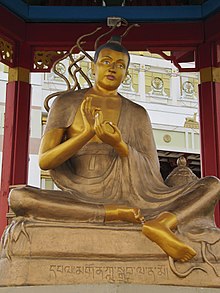Nagarjuna
Nagarjuna was a Buddhist monk and philosopher in the Mahayana tradition, known for the Madhyamaka school of Buddhism.[1] He is highly regarded as one of the most important Buddhist philosophers, and credited as the founder of Madhyamaka philosophy.[2]

His key work is the Mūlamadhyamakakārikā (Root Verses on Madhyamaka), and is a important text explaining the philosophy of emptiness in Madhyamaka. Jan Westerhoff considers Nagarjuna to be among the greatest thinkers in the history of Asian philosophy.[3]
Early life
We have limited reliable information about Nagarjuna's life, and historians disagree on when and where he lived (possibly 1st to 3rd century CE in various places).[4] The earliest surviving accounts were written in Chinese and Tibetan centuries after his death and are mostly hagiographical accounts that are historically unverifiable.[4] The earliest accounts were written centuries later in Chinese and Tibetan, mainly offering hagiographical, unverifiable details.[5]
Some scholars, like Joseph Walser, suggest Nagarjuna served as an advisor to a king of the Satavahana dynasty in the 2nd century, possibly Yajna Sri Satakarni, based on archaeological findings at Amaravati. This places Nagarjuna around 150–250 CE.[5]
References
Other Websites



- Thomas William Rhys Davids (1911). . In Chisholm, Hugh (ed.). Encyclopædia Britannica. Vol. 19 (11th ed.). Cambridge University Press. p. 151.
- Online version of the Ratnāvalī (Precious Garland) in English Translated by Prof. Vidyakaraprabha and Bel-dzek
- Online version of the Suhṛllekha (Letter to a Friend) in English Translated by Alexander Berzin
- Works by or about Nagarjuna at Internet Archive
- Works by Nagarjuna at LibriVox (public domain audiobooks)

- Nārāgjuna vis-à-vis the Āgama-s and Nikāya-s Byoma Kusuma Nepalese Dharmasangha (archived)
- ZenEssays: Nagarjuna and the Madhyamika
- Mula madhyamaka karika online Tibetan and English version translated by Stephen Batchelor (archived)